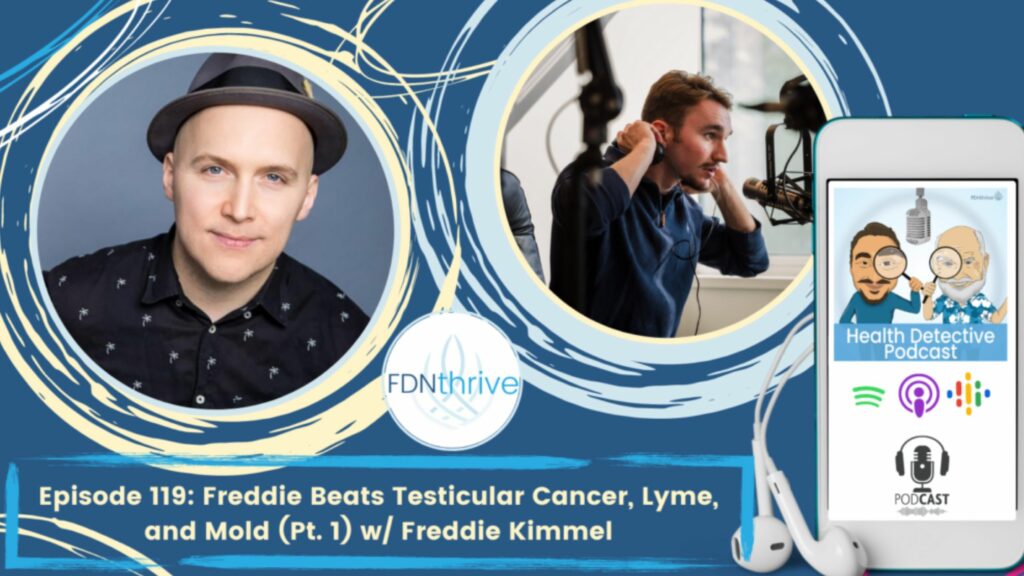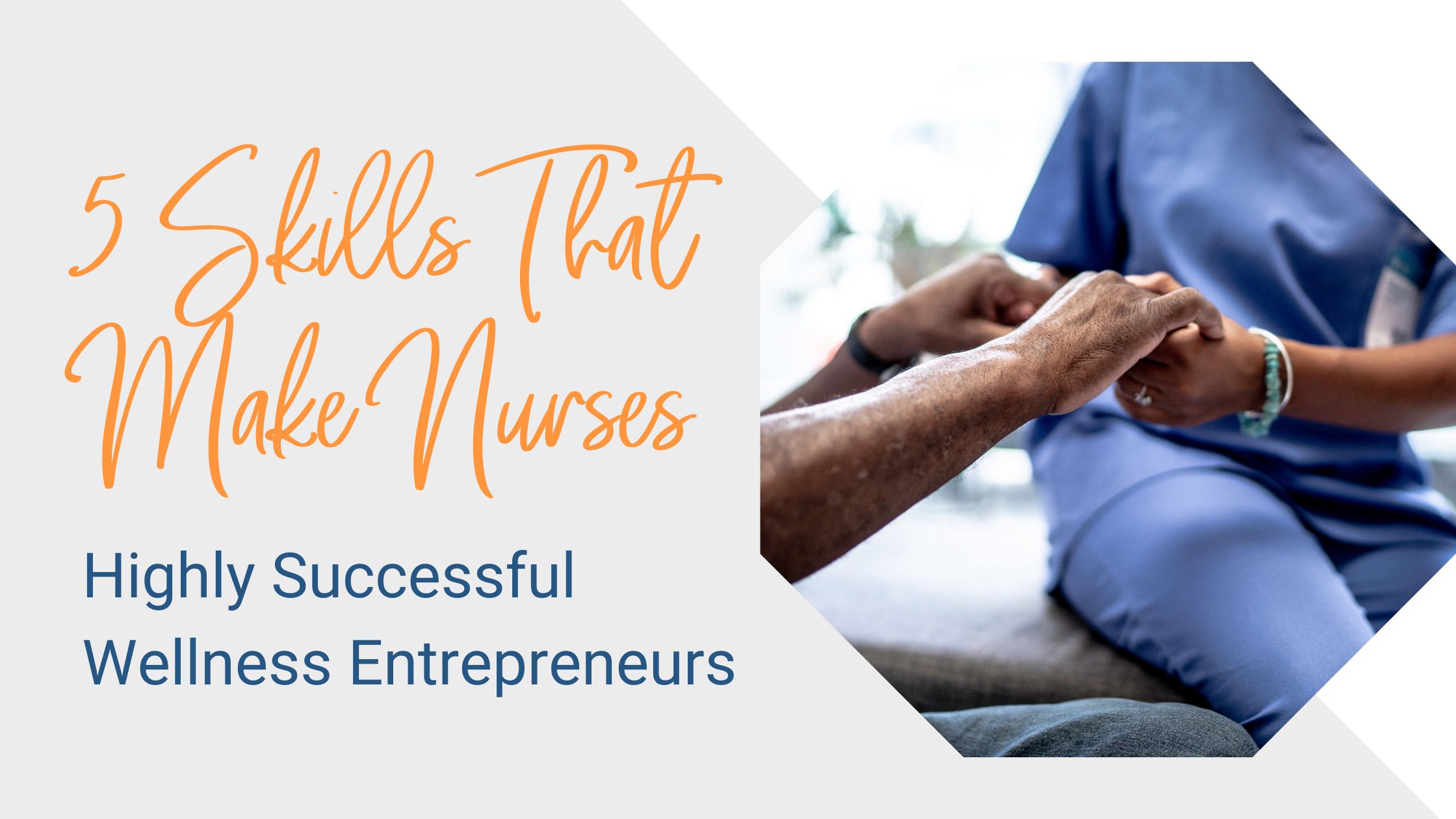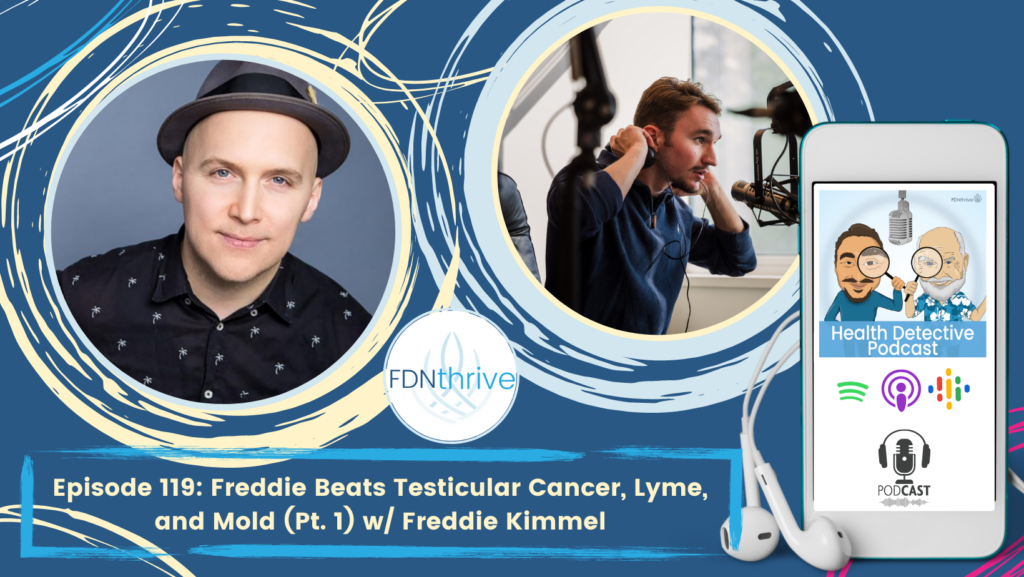
Introduction
[00:00:55] Detective Ev: What is going on my friends.? Welcome back to another episode of the Health Detective Podcast by FDNthrive. My name is Evan Transue, AKA Detective Ev. I will be your host for today’s show all about Freddie Kimmel’s health journey with testicular cancer.
It is really hard in the world of these health interviews to compare one interview to another, because everything affects everyone differently. Most of the people, not all, but most of the people that have come on this show, their health challenges have absolutely rocked their world.
Again, it can be subjective and it’s just different for everyone because some people might have had, let’s say, a 5 out of 10 disease, but it lasted for 30 years. Then others might’ve had a 10 out of 10 disease, but it lasted for a couple of years. I don’t know how to compare those two and we don’t need to compare them. But my point of saying that is because this interview, for me as the interviewer, wow!
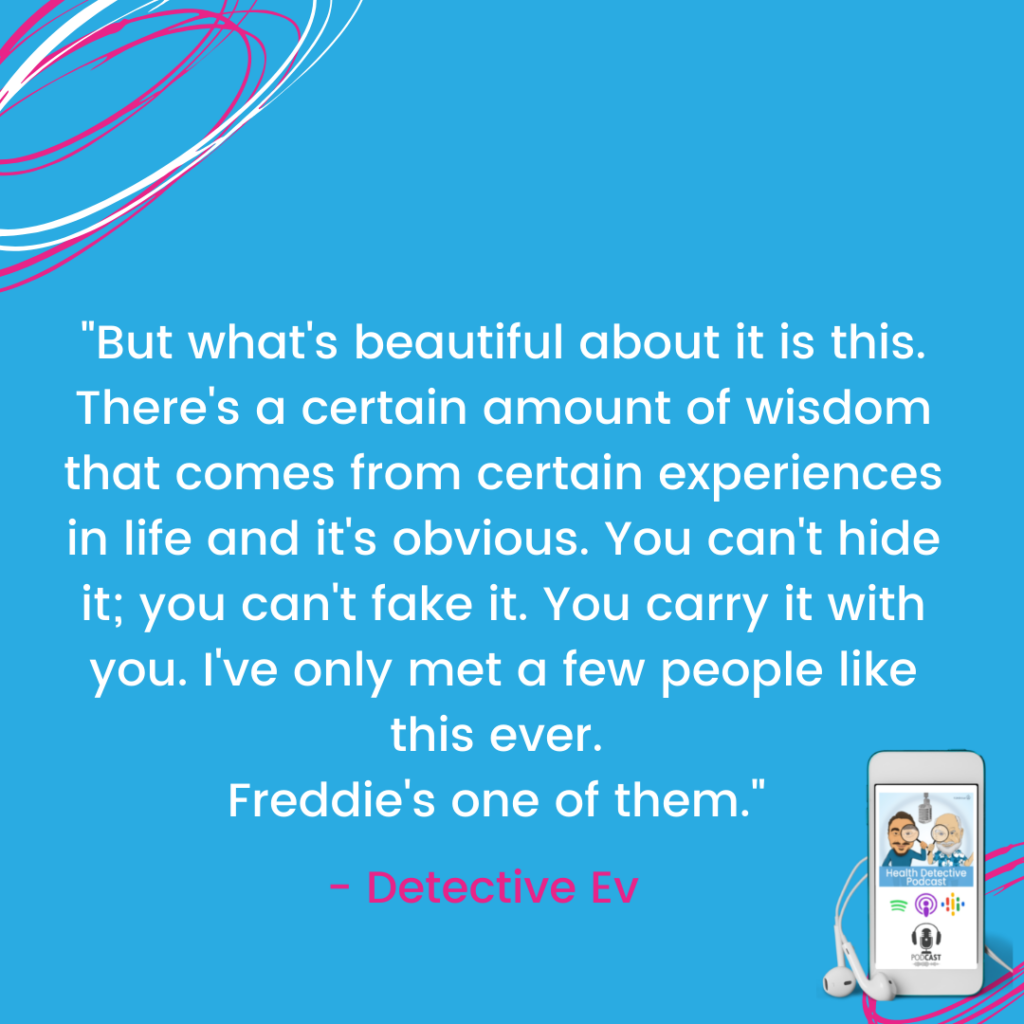
I don’t know that I’ve had an episode like this. I’ll put it that way. This is one of the more intense stories we’ve had on here. But what’s beautiful about it is this. There’s a certain amount of wisdom that comes from certain experiences in life and it’s obvious. You can’t hide it; you can’t fake it. You carry it with you. I’ve only met a few people like this ever. Freddie’s one of them.
It’s interesting because I met Freddie before knowing his story. And I could already feel that vibe. I already could see that. There’s just an appreciation for life and people. And then you hear a story, you’re like, oh. So, it’s overcoming that and having to work through that. That’s how you got to this place. He’s just a wonderful guy. This actually ended up being two parts. I almost never do that on the show, you guys know that. But it just had to be.
A Little About Freddie
With that said, a little bit about Freddie really quick. He is a biohacker, functional health coach, and host of The Beautifully Broken Podcast. He is also a proud survivor of metastatic cancer, Lyme and toxic mold. Part of the transformation he brings to the world is in his roll on the leadership team at AmpCoil, which we’ll talk about in the second episode (really interesting device), and as a consultant for several technology companies in the biohacking industry. Freddie is passionate about education, the energetic body, and patient advocacy.
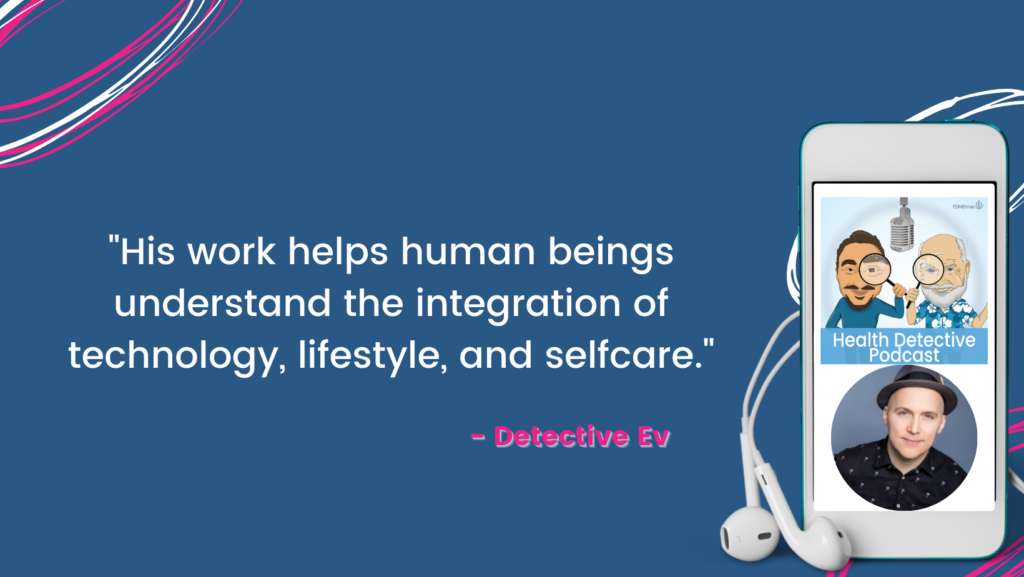
His work helps human beings understand the integration of technology, lifestyle, and selfcare. He has been featured in the Wall Street Journal, The New York Times, LA talk radio, The Late Show with James Corden, ABC television, and in Dance Magazine. You hear Freddie on podcasts, including the Lifestylist with Luke Storey (huge podcast in the space), and the Successful Mind with David Neagle.
Freddie has a Bachelor of Fine Arts from SUNY, Brockport. And in conjunction with starting Freddiesetgo.com has performed all over the country in Broadway touring productions of Phantom of the Opera, Billy Elliot, and the Broadway bound Cagney the Musical.
How interesting is this guy? So, without further ado, let’s get to the episode. All right, Freddie, my friend. Thank you so much for being here. This has been long awaited. Welcome to the Health Detective Podcast.
[00:04:10] Freddie Kimmel: It is an honor to be here.
[00:04:14] Detective Ev: Freddie and I got to meet lucky enough. Reed Davis, as you guys know, founder of FDN – other guy on the logo for the Health Detective Podcast – he couldn’t make the flight into one of the bio-hacking panels that we were doing down in Miami. And he said, I know you love biohacking. Can you fill in? I got to sit next to Freddie. We were doing the panel together.
One Who Found a Resolution to His Testicular Cancer

You know, guys, we have a lot of different stories on here. We talked to a lot of people with autoimmune disease, nothing wrong with that. That’s my story as well. But when you talk about cancer and a resolution to that cancer it’s something that affects people’s lives generally speaking, in much different ways.
Certainly, there’s a spectrum of autoimmunity, I’m not being ignorant here. No, Hashimoto’s is not like cancer, in my opinion, as someone who’s seen both of these things. When we have someone that we’re lucky enough to talk to that was able to get a hold on this and figure some things out for us to teach us about it, I think that’s about as cool as it gets. That’s about as much as I’ll give away.
But, Freddie, we always start with the same question on this podcast. It’s just as simple as, when did your health journey start? When did those health symptoms start, and what did they look like for you?
[00:05:12] Freddie Kimmel: Great question.
His Testicular Cancer Started with Level 10 Pain
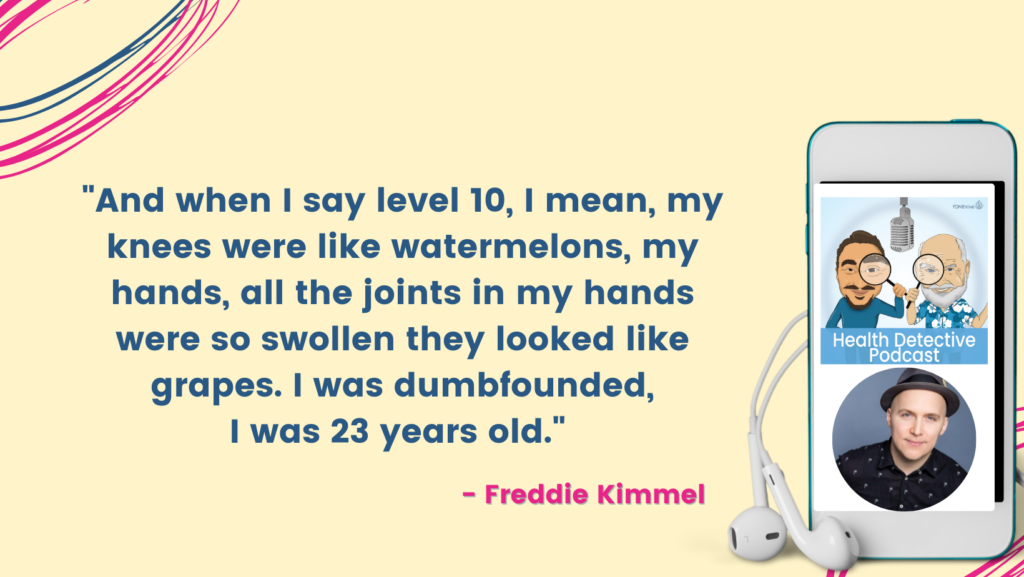
I got to say it was really going to sleep one night in New York City. I had just moved to the city right after September 11th. I had went to bed and woke up in the morning with level 10 joint pain. And when I say level 10, I mean, my knees were like watermelons, my hands, all the joints in my hands were so swollen they looked like grapes. I was dumbfounded, I was 23 years old. I was of the belief system that I would live forever.
I certainly wasn’t going to go to a doctor or dig too far deep into the problem aside from eating Advil, which escalated to Indomethacin, which escalated to Celebrex, and so on, and so forth.
Eventually getting some Hydroxychloroquine into the mix to calm the immune system.
Detective Ev: Before it was cool, right?
Freddie Kimmel: Before it was cool. I’m talking 2001. I’m a Hydroxychloroquine OG. I lived with that level of pain or muting that level of pain – pushing through that level of pain – for quite a few years.
That was 2001. In 2006, I started to have pain in my left testicle. The other really cool part of this backstory is I’m in New York City doing Broadway Music Theater. I moved to the city to sing and dance and tell stories for a living. That was my dream and my passion. Over that arc of me being in the city, even with this really chronic pain going on, I was making it happen. Things were unfolding. I was getting shows.
Actually, truth be told, I got my very first audition I ever walked into the room – national tour of Annie Get Your Gun. It really started to climb that ladder in those respects. Until one morning in 2006, I woke up with a little soreness in my left testicle and I didn’t do anything about it right away.
Advanced Testicular Cancer Diagnosis
And eventually, it got to a place where I did have to go to a doctor. Had to see a specialist who did examine me. And that doctor had offered me, said, listen cancer doesn’t hurt. Don’t worry too much about it. Maybe get an ultrasound at some point. I let it, another three months.

Cut to, one morning where I can barely stand up. I’m sleeping with my legs up against the wall. I’m holding my stomach while I’m on the subway just cause there’s so much pain in there. I dragged myself into a free clinic that referred me to an emergency room.
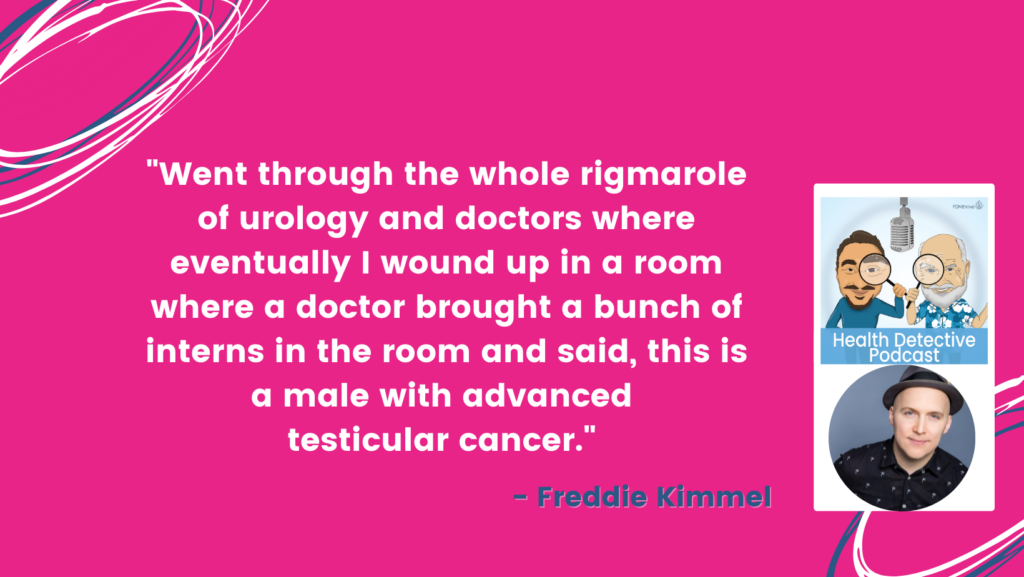
Went through the whole rigmarole of urology and doctors where eventually I wound up in a room where a doctor brought a bunch of interns in the room and said, this is a male with advanced testicular cancer. It’s such a crazy story. I’m telling it now and I’m like, I could keep talking for 10 hours. But that’s really where things started to get, I’m going to say, a level 10 intensity.
[00:08:02] Detective Ev: Wow!
Just to be clear, because I know that this is several months, so by the time you get this diagnosis, have you turned 24? Are you still I’m 23?
[00:08:09] Freddie Kimmel: I’m 23. This is like 23 is the onset of pain. I’m actually 26 years old. It was three years of living with joint pain, chronic autoimmunity.
[00:08:19] Detective Ev: My bad. Oh wow!
Regardless, we’re still very young. I mean, I’m 26 right now. But we’re young and I can’t even imagine getting a diagnosis like that. Especially, I mean, for God’s sake, man, of all things, let’s be honest. That’s exactly where we need cancer if we’re going to get it.
Receiving Empathy but Still Numb
[00:08:30] Freddie Kimmel: Man, I wish I could go back in a time portal.

And so many male doctors and male nurses came over to me in the emergency room. When I flew home and had to go to a different hospital, there were so many different specialists that came and put a hand on my back, and like, bro, we’re all talking about what’s happening for you right now and we’re so sorry. I mean, this happened four or five times, different men who were just so empathetic to, yeah. You do not want cancer of the testicles.
[00:09:03] Detective Ev: Yeah. Oh my God, man. You said you had this mindset that you’re going to live forever. But during this time, certainly you had to be questioning this at some point, obviously you did question enough to have went to a doctor. But did you have any background or idea of what we would call the functional space or biohacking space? Or was that just never something that was on your radar?
You’re performing these shows, that’s the dream. That’s what you’re focused on.
[00:09:24] Freddie Kimmel: Yeah.
Never something that was on my radar and really unbelievably numb to it. Standard American Diet. Now I was in incredible shape, at 23 years old. I was working out four or five times a week. I’m in dance class for a couple hours a day. I’m incredibly active. There’s probably a level of just metabolic superiority associated with my age, but I had no level of awareness around anything. Nothing.
Healthy on the Outside but Sick on the Inside
[00:09:53] Detective Ev: Yeah.
By coincidence, I have two of these today. I’m interviewing someone earlier where this person is getting extremely sick, not a cancer diagnosis, but extremely sick. They’re still out there running Ironmans and thery’re a triathlete.
I find it remarkable that the body has this ability, for some period of time at least, to be able to do things or even look a certain way, which seems very impressive, or “healthy” quote/ unquote, or like a good physique or attractive, yet we could be dealing with something.
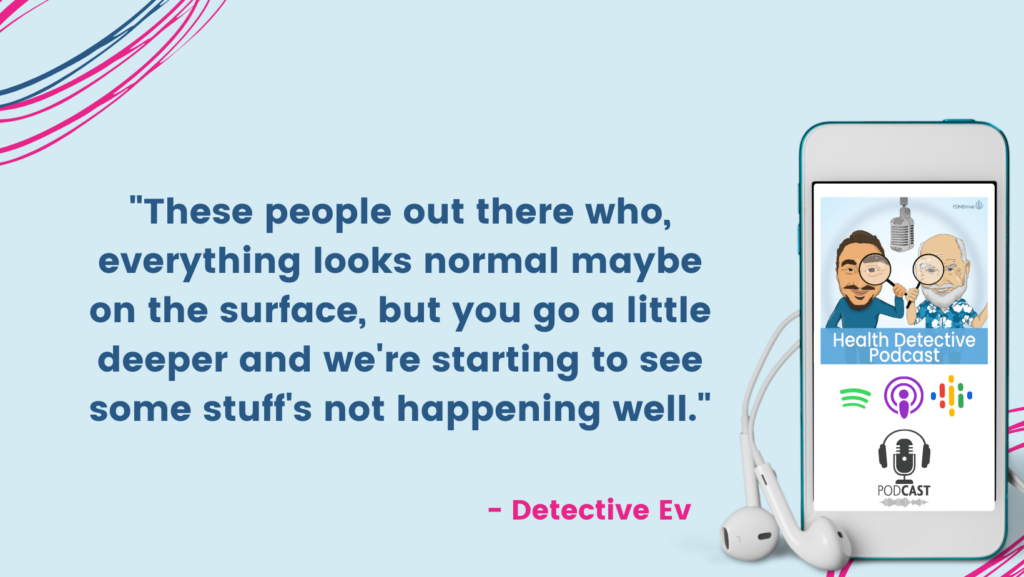
I think that’s one of the fundamental things that FDNthrive and FDN is founded on. These people out there who, everything looks normal, maybe on the surface, but you go a little deeper and we’re starting to see some stuff’s not happening well.
I don’t ever want to bring someone back to this too much, but I know just from seeing you and meeting you in person, people have auras, man. They have energies. There’s such a level of wisdom that’s come to you from this and the healing that you’ve done over the years. I feel like you’re someone who’s done the deep work. I don’t really think you could resolve cancer without that. If you don’t mind sharing, just because I know it will be powerful for people on the podcast.
What the heck is that like in those moments when you’re getting diagnosed with this and you find out that it’s cancer of all things? What’s going through your head, especially as a young guy?
Testicular Cancer is Fast Growing
[00:10:55] Freddie Kimmel: I mean a little bit of shock for the most part. I can say there were one to two times that I had an emotional release in the process of going through cancer. And listen, we could talk about it for days, but if I wanted to frame the diagnosis through initial treatments, through subsequent surgeries in which I was diagnosed or labeled cancer-free, we’re looking at about eight months. So, it’s a long time, right? It’s a big chunk of time.
As you’re watching scans come up on a wall and they’re pointing to your peritoneum cavity, and you’re showing here’s a tumor, here’s a tumor. Here’s one wrapped around your left kidney. Here’s one wrapped around the superior vena cava going to your heart. Here’s one on the descending colon, and you’re just watching it. You start to hear it for a little while and then it just sorta becomes noise.
Luckily for me, in the field of testicular cancer, almost for a majority of the people, there’s a silver bullet chemotherapy regime known as Etoposide Cisplatin. It actually came out with Cisplatin first, which is very effective against that type of tumor, that genetic makeup. I think I had a nonseminomal type of carcinogenic tumor, which is very similar to what Lance Armstrong had.

If you start to get into this world of testicular cancer, what you find out is it’s unbelievably rapid growing. If you were to have a tumor and you were to do nothing about it, you could easily be gone in a year because the progression is testicular to lymphatics, to lung, to brain. Because the cell reproduces so fast, chemo does have a good effect on it. So, it’s one of those cancers where chemo is very good at having an effect on that manifestation, that physical manifestation that is cancer.
Intensive & Extensive Treatment Plan for Testicular Cancer
Now I’m sitting there, and I have dreams of being a Broadway performer. In fact, Evan, I had booked my big pre-Broadway show in Washington, DC, that I was going to go sing for the president and it was going to transfer to Broadway. I had not let go of that ideology in any of these initial sit downs with doctors. I’m thinking, I’m going to be through this in like six weeks, eight weeks. And like, what can we do to get me back on stage?
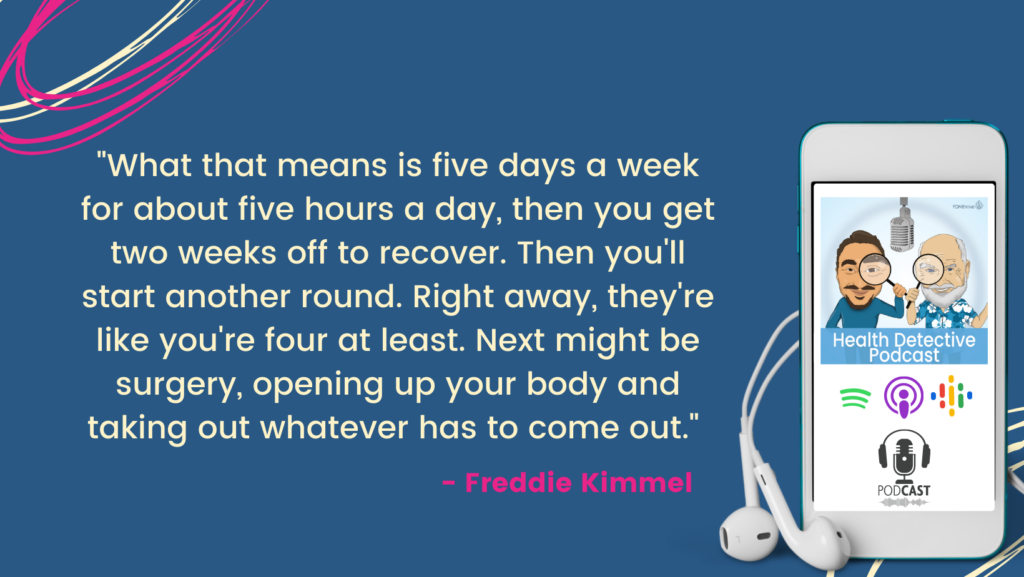
When they started recommending how long they’ll do chemo – we could do one round, two round, three round with testicular cancer. The most they’ll do is four. What that means is five days a week for about five hours a day, then you get two weeks off to recover. Then you’ll start another round. Right away, they’re like you’re four at least.
Like we’re four and then we’re going to scan. We’ll see what we have to do next. I was like, next? They’re like, yes. Next might be surgery, opening up your body and taking out whatever has to come out. It really was a state of complete shock. I’m imagining at 23, I’m never going to be a father. Maybe I won’t have sex. What parts of my body am I going to lose? What degree of neuropathy will I have from some of these chemical agents?
I was just signing waiver after waiver after waiver. You can imagine the legal ease that is in the liability forms and sign-aways. Yes, I agree to take this medicine. You know what? They don’t put that in movies cause nobody would ever do chemo, if you had to read some of those documents. Wouldn’t happen.
I’ll often reference that genetically, I was probably wired to be able to survive this in some way, because of my attitude and ability to focus on what I have control over, which is very little. That experience of being diagnosed with that severity of disease, it’s something, to be honest with you, some of the trauma of that, I unpacked last year. This was 2006.
The Emotional Side of the Healing Journey from Testicular Cancer
[00:14:48] Detective Ev: No worries. I totally get that.

[00:14:50] Freddie Kimmel: I still have things coming up in a very severe way. Levels of healing happened with that, of course, but it was a process. A lot of that journey was made possible by the fact that I was ignorant and didn’t know everything that I know now. It would probably be much harder for me now, knowing what I know about the body systems, the severity of some of these medicines. I think, again, ignorance is bliss in a case like this.
[00:15:15] Detective Ev: Took the words out of my mouth. I was just about to say, this is a case where this is the epitome of “ignorance is bliss”. It’s actually almost probably a good thing. For those that don’t know, I would assume most of our audience does, but just like there’s the placebo effect, there is the opposite. You can literally think yourself into getting a bad effect. If it’s going to come to something like chemo, whether or not it’s highly effective for this type of cancer, why would we want to know any of the bad stuff?
It really is like; this is what you gotta do at this time. That’s your best option for you with that current information. I got to do this. I don’t want to know any of the negative stuff because you could act like, oh, well, I’ll know about it, then I’ll put it out of my mind. Well, that subconscious goes pretty deep.
There’s nothing I appreciate more than someone coming on here and just being real in general, but also saying like, you know what, Ev, I just unpacked some of that stuff last year. Dude, I’m on three weeks ago talking about some more emotional stuff. You can get the biochemical stuff down pretty easily, especially if you’re guys like us who are more in tune with the science, and we like learning about that stuff. But the emotional stuff’s a different skill.
The Healing Journey is an Ongoing Process Mentally
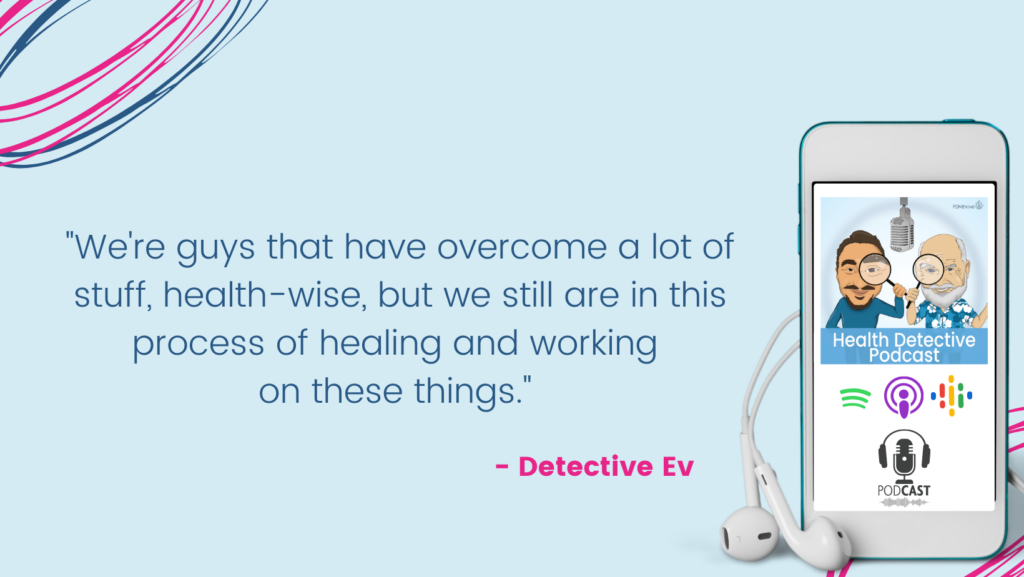
I might be very intelligent in one way that does not mean (I’m talking to myself now), that does not mean I have that awareness in the other way. I’ve really needed to work on that. I think it’s so important to come on here and show, hey, we’re guys that have overcome a lot of stuff, health-wise, but we still are in this process of healing and working on these things.
It’s a beautiful thing that you’re doing that. Because the fact that you’re working on that now as still a relatively young guy, who knows what you’re preventing 15 years from now? I feel like I’m the type of guy that would wind up getting a heart attack from just being all over the place all the time. I need to slow down and work on, why do I feel the need to be all over the place all the time? So that’s cool. Whenever we can talk about that, that’s great.
Now you’re going through these traditional forms of treatment, and you said it’s highly effective. Was that working well then initially? Was that overall going as well as it possibly could? How did the next several months look with these traditional treatments?
[00:16:56] Freddie Kimmel: Yeah.
Very Fragile Immune System During Testicular Cancer Treatment
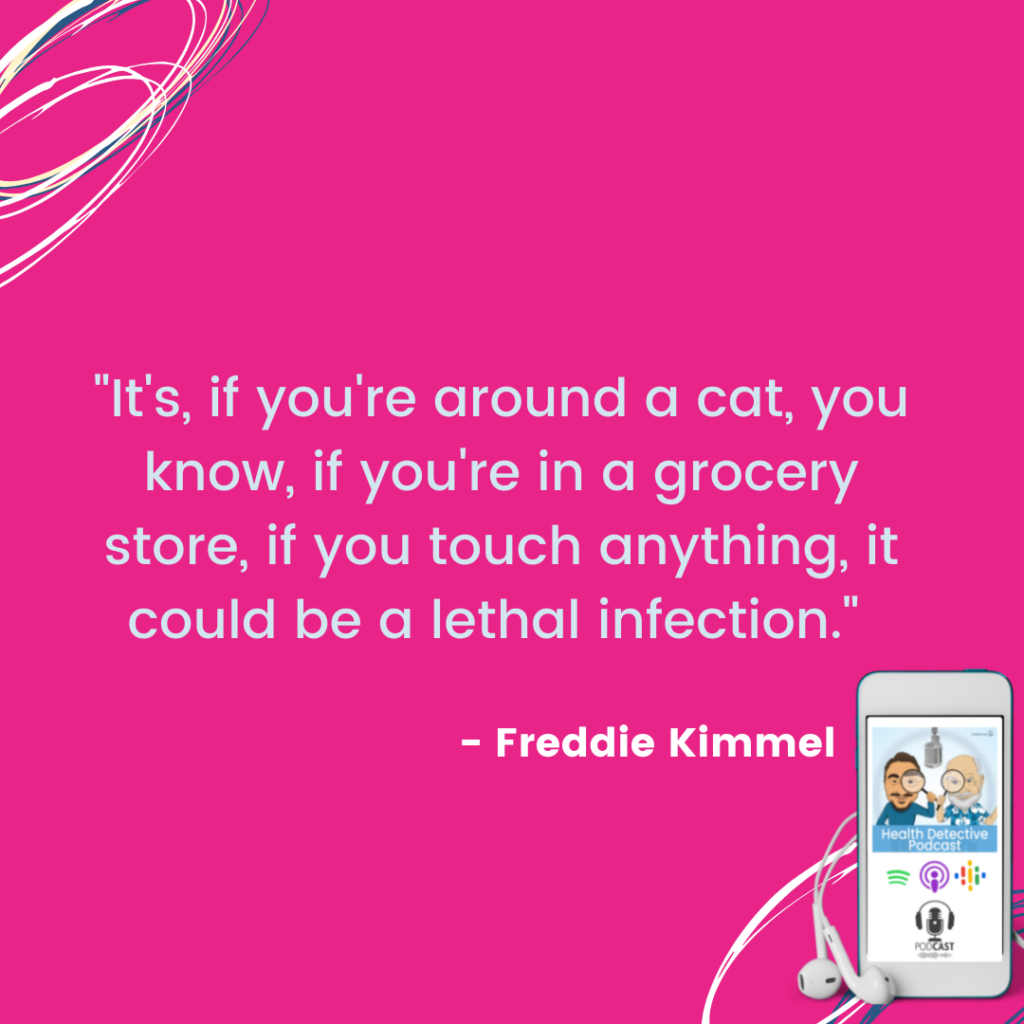
They start you on high dose chemo and it’s really based on how your body tolerates. I had a relatively, I’ll say, easy time with it. The fact that there was only one time I had to stop treatment. Because you really have to keep a monitoring on your white blood cell count when it goes to zero. It’s, if you’re around a cat, you know, if you’re in a grocery store, if you touch anything, it could be a lethal infection.
They said, if you have a fever, you come to the ER. You do not try to do anything, you got to get in here. So, it was always nervous system is on absolute high alert. I pushed through all of the rounds of all four rounds of chemo with the hope and the belief system being that when I’m done with the fourth one that I would be done with cancer treatment. All the while they are doing intermittent MRIs and we’re doing tumor markers.
My tumor happened to produce LDN, Alpha-fetoprotein, and HCG. Which that was just something that my hormones, my tumor produced is a result of that cellular makeup. So, I was watching those numbers. I’m watching them come down some weeks and they jump up a little bit and then they go down.
And I remember when they got all the way down to zero, I was like, oh my God, I can stop chemo. I’m done early. There’s no more levels of disease in my blood. They’re like, no, we’re going to keep throwing it at you. It was interesting. As the time progressed, the severity was worse.
An Unfamiliar Person all Together
The appetite was diminished. I have to say looking back in pictures now, it was amazing to watch how my body and my face changed. I lost a good majority of muscle tone on my body, and I got really bloated in the face. My face was like a round ball from the steroids. What was I on? Decadron, something of that nature.
I was on these steroids. They’re like, we got to keep your appetite up. We gotta keep your appetite up. I’m not even gonna go into unpacking why they were saying that and how I feel now that that is invalidated. But I’m on these high dose steroids to keep my appetite up and keep inflammation down of course, from the chemotherapy.
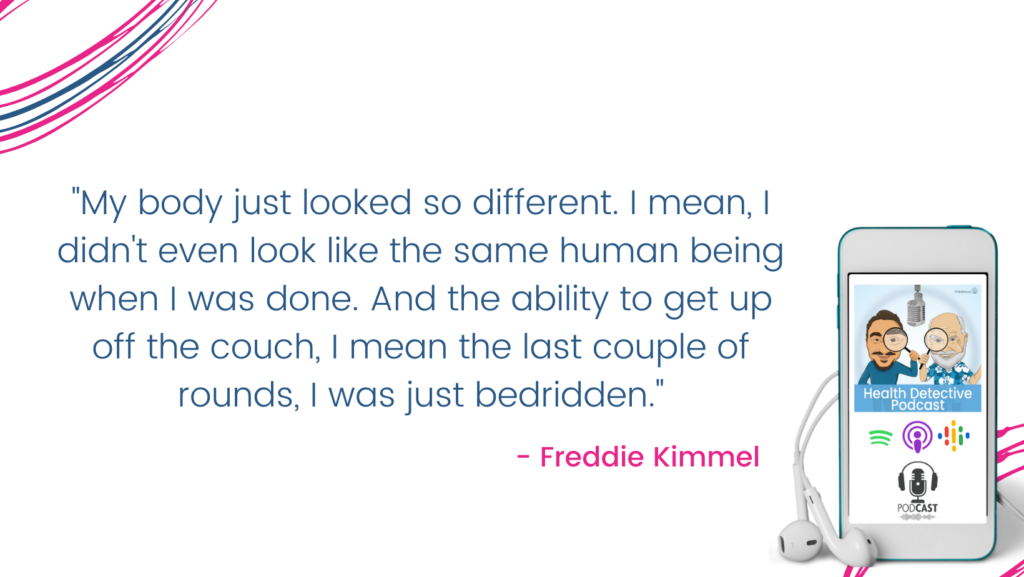
My body just looked so different. I mean, I didn’t even look like the same human being when I was done. And the ability to get up off the couch, I mean the last couple of rounds, I was just bedridden. I was at the hospital in a chair, or I was down in front of a television. Really, not a lot of life force left in my body.
So, it was a real struggle. I think as you near toward the ends of chemotherapy, that your anxiety really starts to build. Cause you wonder, you’re like, well, what’s next? What’s coming down the pipe?
[00:19:36] Detective Ev: And so, what was coming down the pipe? Cause you said that you believed that the fourth one was going to be the last treatment. I’m assuming that was not, in fact, the last treatment, the way that you worded that, correct?
Surgery Ahead
[00:19:45] Freddie Kimmel: Correct.
Essentially you got to kind of let your last round settle into the body. You wait a few weeks, you set a scan off for, I think I’d set mine four weeks after treatment. I’d have to review my record, something like that. I remember sitting down in a room to review the scans and was kind of waiting for that permission slip back to New York.
We sat down, and we pulled my scans up on the board. I just remember the doctor pulled out the pointer and he’s like, well, I can still see a mass here and here and here and here. Sort of everything went numb again. I was really trying to listen to this meeting.
I go back to this place a lot. It was like one of those wild times in your life. You’re like, huh, so this is it. I had that feeling. I was really panicked. Then they brought up another slide and they had this diagram of the body. They’re like, here’s what we’re gonna do.
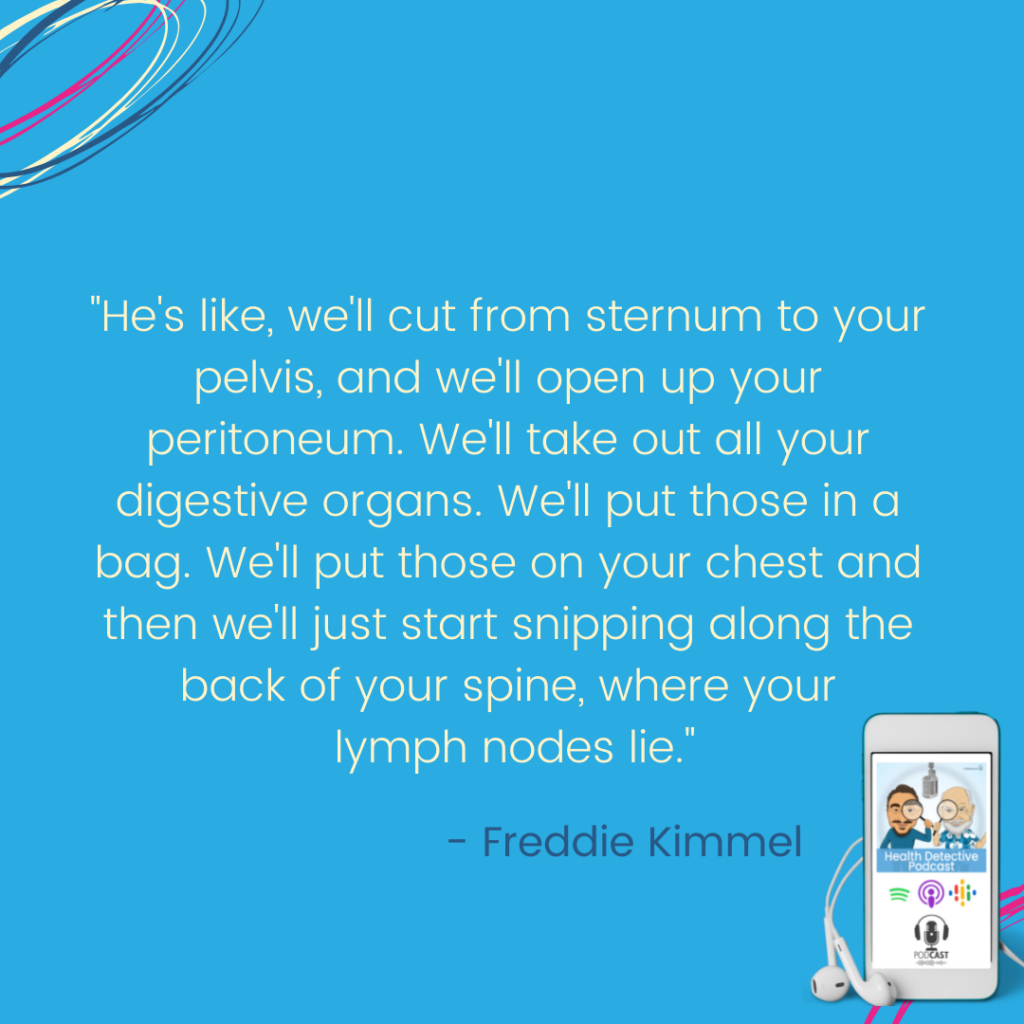
They have my body up there and he starts drawing little dot lines. He’s like, we’ll cut from sternum to your pelvis, and we’ll open up your peritoneum. We’ll take out all your digestive organs. We’ll put those in a bag. We’ll put those on your chest and then we’ll just start snipping along the back of your spine, where your lymph nodes lie. We’ll have a surgical team standing by because the one tumor that is attached to your vena cava, when we start to really work with that line of primary blood flow, it’s good chance you’re going to have a stroke. Of course, we’ll also have prep for your rehabilitation.
Too Much to Think About
So, if that happens, we’ll work for you to regain your speech or whatever movement you may need. I mean, he just kept going and going, and I was just shaking. I remember he was like, so we’ll schedule this for about six weeks out. That’s the only time I spoke up in the whole thing. I was like, guys, I accept that. There is no way.
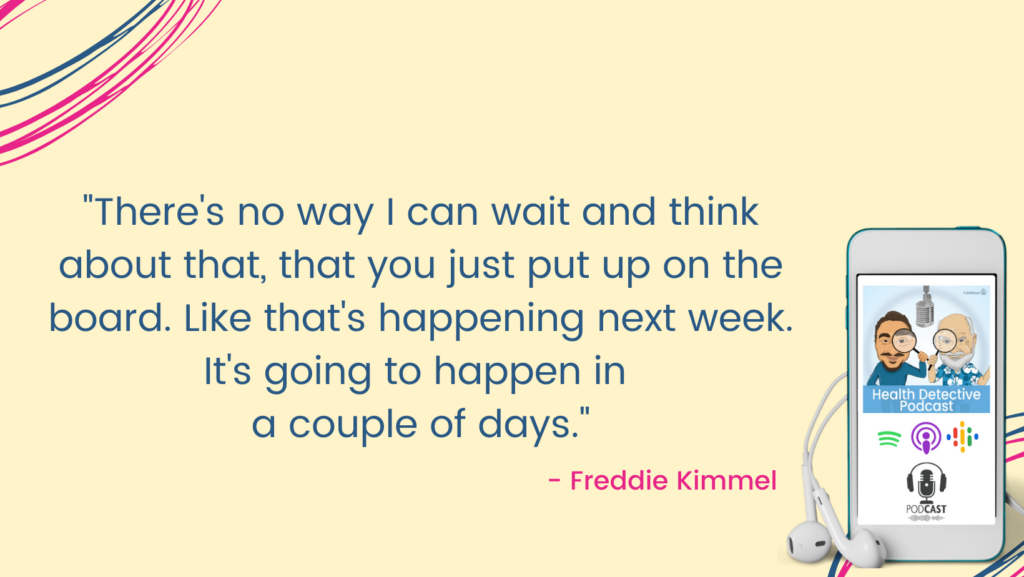
There’s no way I can wait and think about that, that you just put up on the board. Like that’s happening next week. It’s going to happen in a couple of days. I cannot think about that. He laughed a little bit, and he was like, I hear you.
I got up, walked out of the room, and I fell on the floor of the hospital. My dad had to pick me up. I literally fell on the floor. My dad had to pick me up and I was just unconsolable. He had also said the likelihood of you being able to have an erection again is small.

The nature of a retroperitoneal lymph node dissection (which is what we’re doing), the likelihood of you being able to have children because of the nature of cutting the nerves in a peritoneum cavity will affect the way you ejaculate. That is often, it’s often reversed. So, the ejaculate goes in, which is wild to me. I’m still blown away by that concept. And it wasn’t just the surgery or the things. It was like my manhood, my livelihood, my ability to have a family, in a 30-minute sit down. It was the only option.
Now, let me say this. In retrospect, had I not been loaded with so much fear, I could have waited. I could’ve said, you know what? It’s my body. Let’s observe. Let’s look at the markers. Let’s see what’s going to be found in the peritoneum. Let’s see if anything in there starts to produce cellular activity again.
Are These the Best Tools They Have?
Cause what I was told is there’s a chance that chemotherapy can melt tumors. Like they’re gone. That’s what we’re hoping for. The other thing that can happen is they can crisp down just like a marshmallow, almost be just this completely necrotic tissue. Whether there was active cancer in my body or whether it was necrotic tissue, nobody knew. It was just, we’re going to go in, we’re going to explore, we got to get this out.
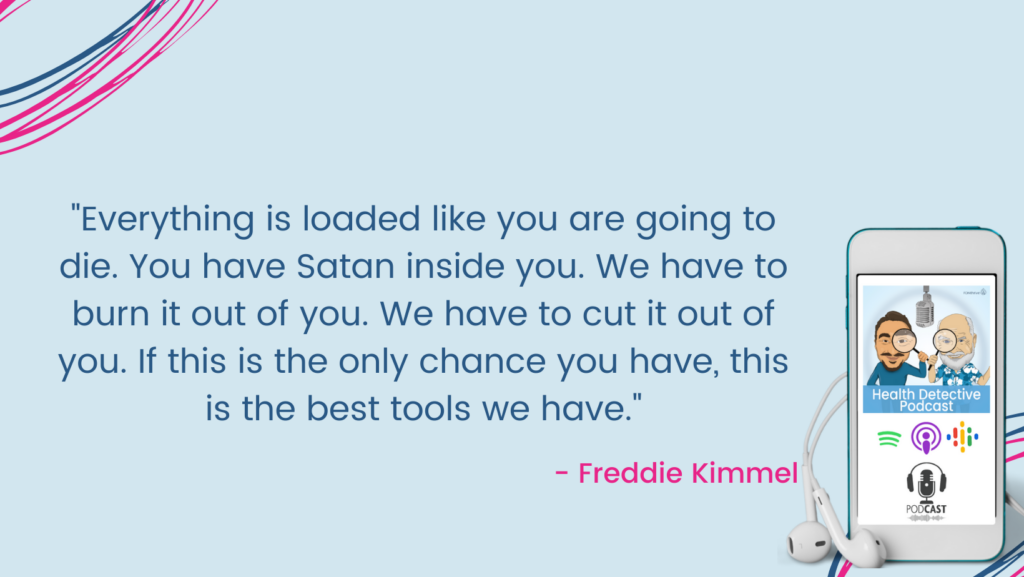
And listen, hindsight’s 2020. I say I would have waited, but probably not. Let’s be honest. In retrospect, I just want to keep saying in 2020, you’re like, I’ve had 15 years to reflect on this. Everything is loaded like you are going to die. You have Satan inside you. We have to burn it out of you. We have to cut it out of you. If this is the only chance you have, this is the best tools we have.
I took everything that was told to me as fact, I did not question it. I did not look elsewhere. I do remember somebody coming to me (I’m going to save their name) and telling me, Freddie, there’s these mushrooms that help with cancer. And I was like, get away from me. I was so offended. I was like, oh, well, when you get cancer, you can make that gamble. Do you know what I mean? I didn’t have any other information.
Post-Surgery Complications
To jump to this next part, like the surgery that was supposed to be in and out in three days, turned into, me in intensive care for 12 or 14 days. The epidural failed my body after this intense surgery.

I remember waking up from the surgery and I was like, I’m in trouble. Because the level of pain that I was feeling was blinding. It didn’t make sense. Shaking, full body tremors. What had happened, my epidural had failed. It had come out in the procedure of maybe moving me from bed to bed. So, right away, the first three days were just like hell – a pain that, yeah, I dunno. I couldn’t make it up. I couldn’t paint it in a movie. It was the worst gruesome thing you’ve seen in a movie. I mean, imagine cutting, like from your sternum to your belly and taking everything out, packing it all back in, and then you don’t have a pain med.
I have tubes down my throat. I have a tube down my mouth that pull the digestive juices out of my stomach. There’s no way for me to eat anything. There’s no way to get pain meds in me right now. It was unbelievable. It needed to be a localized epidural. Yeah. The hits just kept coming.
It was like the body is supposed to absorb post-surgical fluid. After we do surgery, the intestines and large intestines, they act just like a sponge for all that. There is a little bit of blood and there’s scarring in that peritoneum cavity. What my body decided to do was not absorb any fluid, a condition called Third Spacing.
Geyser Fluid Retention Drain
And essentially what happened, if you were to see pictures of my belly with these, whatever 55, 45 staples in it, I looked like I was in my third trimester. I mean, my belly was massive. And the instruction from the doctor was like, you got to walk, Freddie. You got to get up and walk. You got to get up and walk. Imagine the staples, epidural’s not functioning so well, I’m getting up and dragging this cart.
I’ve got this very famous picture I post on Instagram all the time with me. I’ve got a stand here with like, 25 bags on it. I’m just looping, looping, looping. Eventually what happened is (and this is a graphic story but amazing), is that I was laying in bed and my belly button popped. Two staples exploded from my belly and my belly started to drain.
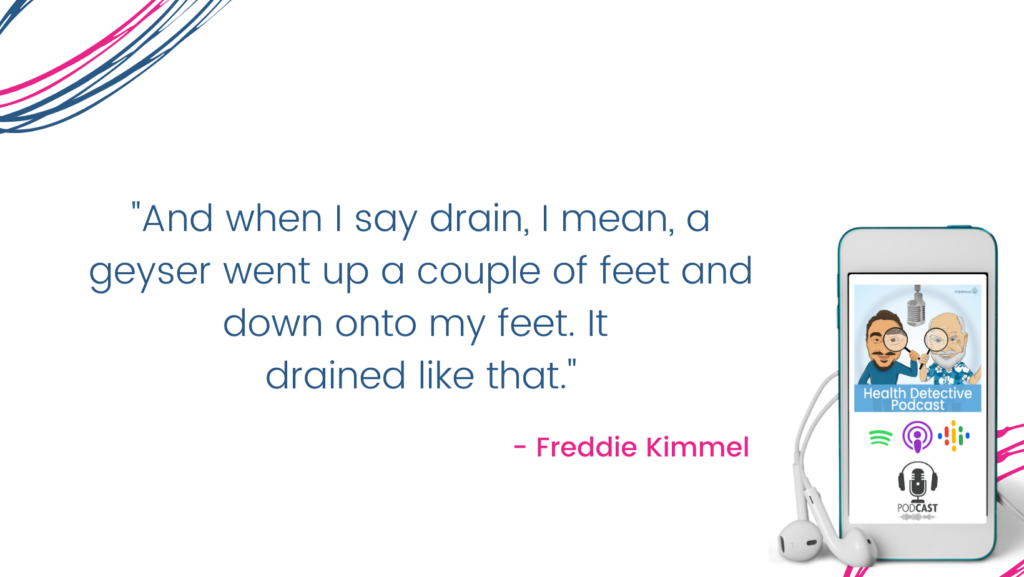
And when I say drain, I mean, a geyser went up a couple of feet and down onto my feet. It drained like that. My mom was in the room, I’m like, mom, I’m dying. My mom’s a nurse, thank God. My mom stayed with me every single day I was in the hospital. However long I was in this room. She sat in the chair next to me and we just let it drain and drain and drain and drain. Eventually, it came to a place where we had to put a port in my side. We got the excess fluids out, and my body started to absorb some of these fluids naturally. I started to finally recover from this retroperitoneal lymph node dissection.
I’ve heard this many times from many other people that have been through testicular cancer. It’s one of the most complicated surgeries, there’s a lot of complications, and it doesn’t always go well. That was my experience.
Wealth of Information
[00:27:53] Detective Ev: Holy crap, man. I’ve done every interview on this podcast. Reed hops on occasionally when he can, but he’s obviously, extremely busy guy that has many things to do. I’m supposed to be the main one doing this.
It’s not like it’s a competition, but like, my God. We’ve talked about some insane health stuff here. I just don’t know that we’ve talked to someone that’s dealt with something like this. Maybe we didn’t get into as in-depth of details with certain cancer stories.

Regardless, I feel like it’s really important to do this because you’re right. It’s not just for the video. I’m realizing, I’m like, oh my God, it’s giving me the shivers. I don’t really get that on this show. I’m kind of used to hearing all of these crazy things. I’m in this space. But yeah, this is what people need to hear about. If for no other reason than encouragement to do as many preventative things in their life as they possibly can, but also to hopefully just give some empathy.
Before the next question, I got to focus on one point. I love that you said how you felt when that person came to you with the mushroom thing? My aunt, unfortunately she did pass away in 2020, in November. It was after a three-year battle with cancer.
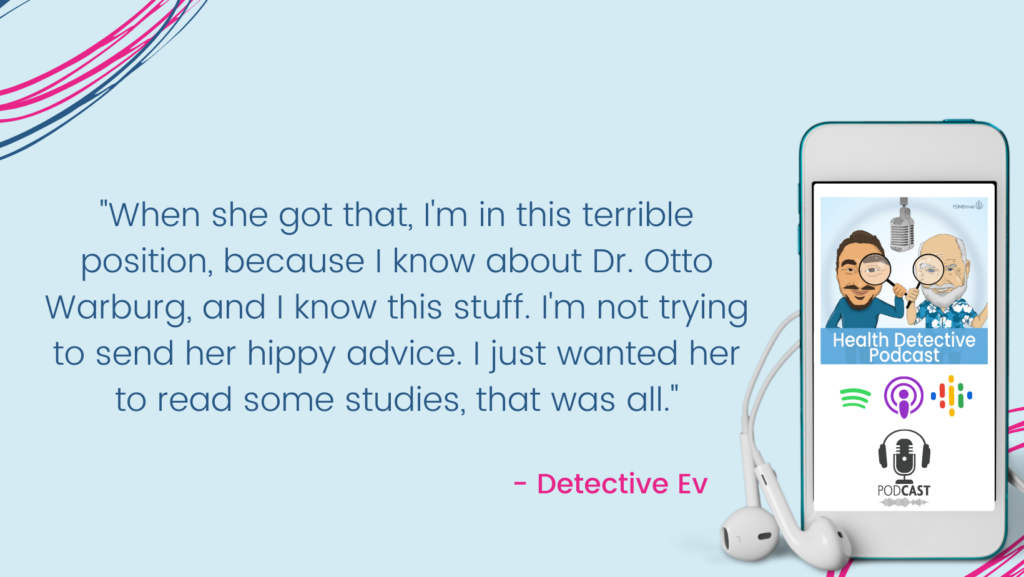
When she got that, I’m in this terrible position, because I know about Dr. Otto Warburg, and I know this stuff. I’m not trying to send her hippy advice. I just wanted her to read some studies, that was all. I sent one single text message to her and my uncle. And I said, hey, You guys know that I’ve done some weird stuff with health, that’s for sure. At that point I had results and I’m like, I just would love for you guys to read this stuff if you want. I’ll never bother you about it again. And I didn’t. They said, thank you. And that was it.
Respect the Mental Processing of a Cancer Diagnosis

People don’t get, by the time that you end up in this world of functional medicine, you’ve been through the ringer. You’ve tried a lot of things and it hasn’t worked. You have the time to think about this. Guys, when a family member or friend, I’m not saying don’t share with them information. I would never have been able to live with myself if I didn’t share the things that I shared with my aunt. But it is what it is now, she’s passed. You got to respect what it’s like getting this diagnosis. Like you said, you used the key word. It’s fear.
You’re just, bam, I’m locked in. Now, you’re moving through the motions. What do I need to do? How do I save my own life right now? Again, it’s not like a Hashimoto’s diagnosis and I’m not lessening that. Again, we talk to people with that all the time. You have time with Hashimoto’s guys, you’re not going to die tomorrow. You’re not going to die in 10 years most likely. It doesn’t really kill people more or less. It barely affects the life expectancy if I’m not mistaken. This is a serious thing. We have only a set amount of decisions that you can make that are going to lead to either your life or no life.
No, I don’t blame someone that doesn’t know anything about this stuff for being like, hey yeah, screw your mushrooms right now, man. Or screw your studies, I need to trust this doctor. Fair enough. We need to be respectful. We need to come in with love and just give people space. We can’t be giving them a bunch of unsolicited advice. I feel like functional medicine aside, from what I saw with my aunt, the unsolicited advice thing seems to be almost universal.
Give the Cancer Patient Their Space
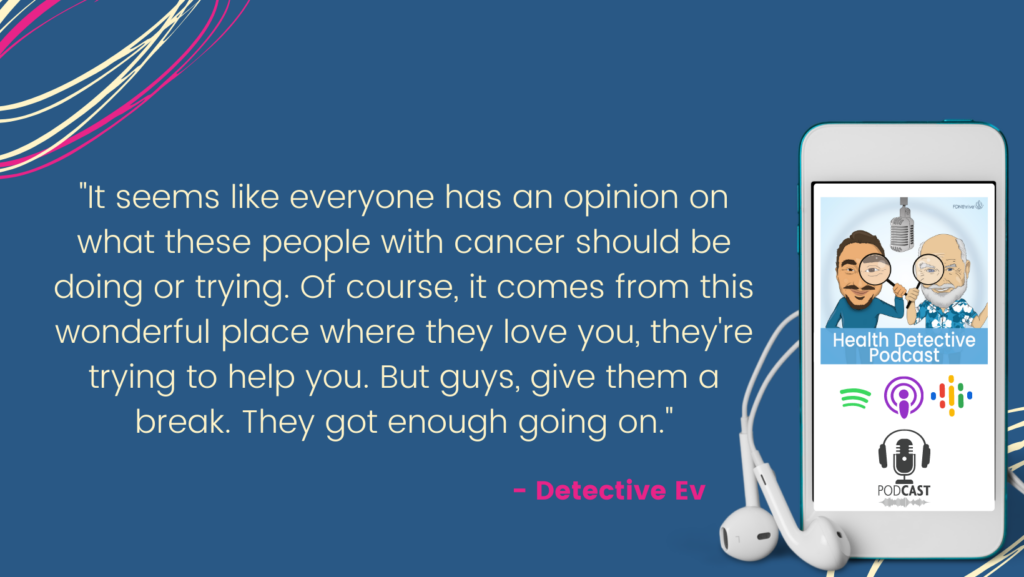
I’m not sure if you dealt with that. It seems like everyone has an opinion on what these people with cancer should be doing or trying. Of course, it comes from this wonderful place where they love you, they’re trying to help you. But guys, give them a break. They got enough going on.
They don’t need to be thinking about the 20 different text messages you sent with all this stuff. I just, I liked that you brought that up. It hit home for me. Honestly, man, you made me feel better because I feel like I did what I could. I’m like I have to send something. I will never be able to live with myself if I don’t show her some of these studies. She’s an intelligent woman (was an intelligent woman), and she’s allowed to do what she wants. And just because I sent her studies doesn’t mean that that would’ve worked. She did the best that she could. I know that.
With all this said, you obviously took a huge 180 from this traditional route to the biohacking freaking expert that you are now and the things that you know. You’re on these panels throwing the stuff down. Where the heck did we start getting into that? At what point do you draw the line and say I’m going to go find something different?
Testicular Cancer Free While More Issues Arise
[00:31:22] Freddie Kimmel: Yeah. I mean, I wish it was right after I had cancer. Eventually I had a doctor walk in and my whole family was in the room. They put their hands on me and they were like, Freddie, we got the results back from the surgery.
This tissue was necrotic, was an active cancer. You’re cancer free. My whole family’s in the room and everybody burst out in tears. Everybody started crying. It was amazing. I was so blessed to have the support system and the resources and Western medicine, right? Saved my life. It was in this moment that I was like, great! I’m going to write a book. I’m going to be a poster child for every testicular cancer patient out there. I’m going to be on Oprah. All these amazing things are gonna happen for me.
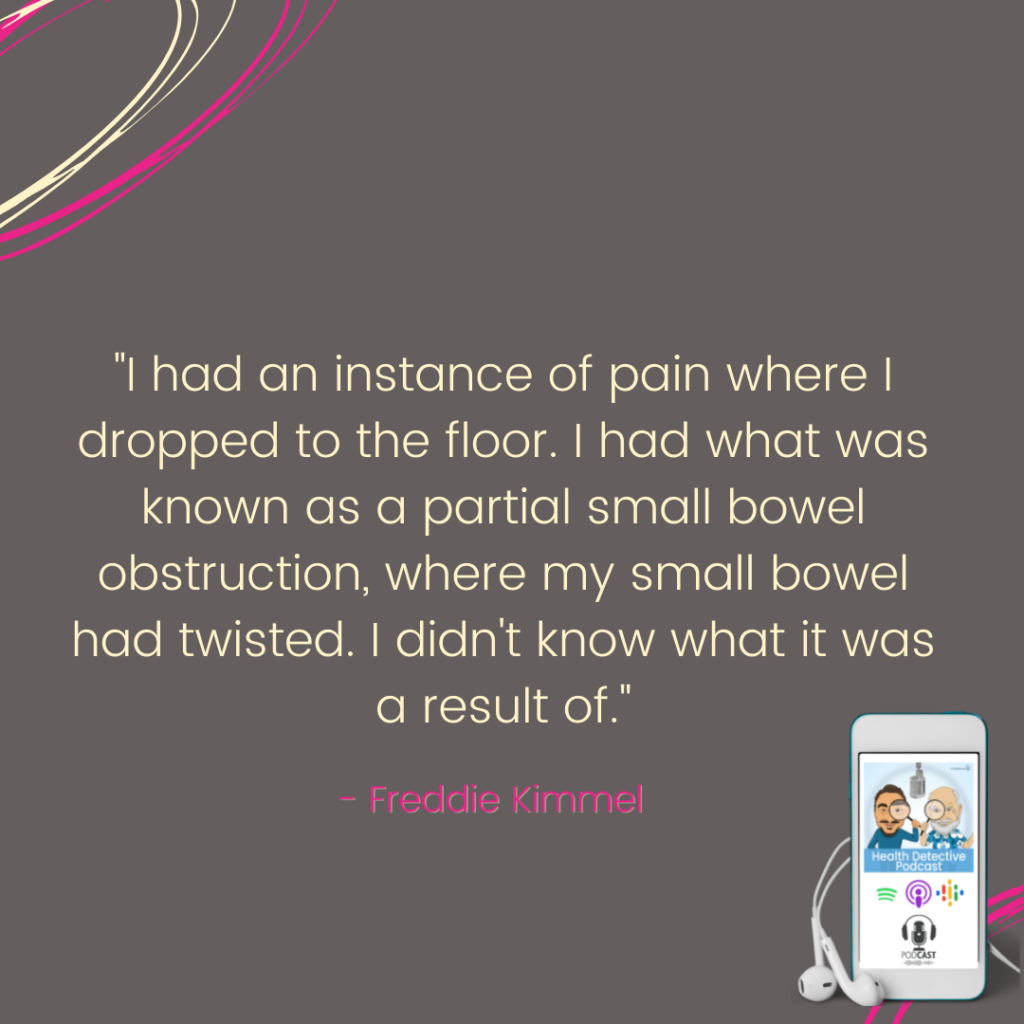
Probably six weeks after the surgery, I was eating lunch at my brothers. No, I had went out the night before with a bunch of friends and just been a little social. It was just out talking. And I had an instance of pain where I dropped to the floor. I had what was known as a partial small bowel obstruction, where my small bowel had twisted. I didn’t know what it was a result of. I was rushed to the emergency room, given an IV. Incredible, incredible pain, like level, level 10.
The doctors basically said, as a result of the surgery we did, you could have some scar tissue forming very quickly. I was like, kind of shocked. It’s just like six, eight weeks ago. But we kind of left it there and they were like, yeah, just watch what you eat. Maybe take it easy for a couple days.
Well, over the next few years that just kept happening. I would have these instances where I would eat, and my bowel would twist. And I would just throw up for two days because nothing could get by. I mean, on the floor, on your knees, praying to God, a level 10 pain. If you’ve ever read anything about abdominal adhesions, it’s a really bad side effect to surgery and it’s very common.
Continual Abdominal Adhesions Take a Toll
Once you touch the small intestines with a hand or a finger, they almost form as a reaction to that microtrauma, adhesions. It would almost be looking at the small bowels, like there’s a bunch of spiderwebs in your belly. Imagine if you just roll over to grab your iPhone or something. That twisting motion would normally be fine cause the intestines roll around in there, like a bag of wet spaghetti. But if you had a bunch of gum in there and easy to twist, and they can knot.
Over the next few years (I promise, I’ll bring this story to a “when do we start to feel better?” place), I started to be rushed to the emergency room. In 2011, it was so bad it wouldn’t release. They cut open the same wound, chest, from my sternum all the way down to my belly button, took out a foot of small bowel, and then sewed me back up. It happened again and there was more scar tissue.
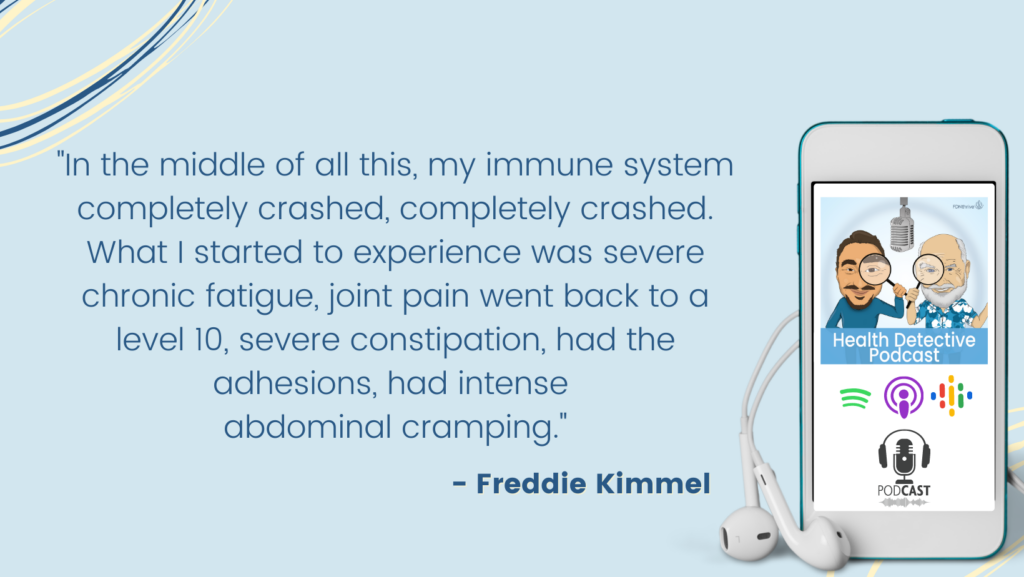
Then they went in laparoscopically in 2015. In the middle of all this, my immune system completely crashed, completely crashed. What I started to experience was severe chronic fatigue, joint pain went back to a level 10, severe constipation, had the adhesions, had intense abdominal cramping.
I started to kind of explore, I’m like, I’m a mess. I was like, wow! I was like, God forbid, anybody ever try to mug me on the street. I could never defend myself. I was feeling so compromised. I started to explore functional medicine. I started to really do the deep dive on what can I do to start to find some level of improvement.
Labs Reveal the Hidden Stressors
The scar tissue, the fatigue, the aches, the pains, going back to 2003. I never really figured out the onset of the chronic inflammation, 2001, when I was 23 years old. I was looking at this barrel, this bucket of dysfunction, which for me, was just overflowing at this point. I remember some of the things that I started to explore what were heavy metal toxicity.
I remember doing an HTMA test and mercury was off the charts – 99%. Lots of other metals. Associated with chronic fatigue, of course, I stumbled across Epstein-Barr, chronic viral infections. I was like, oh, this is great. This is what I have. I’ve got chronic viral infections. This is the problem. I went down that road for a little while.

Then did some more testing, sent my blood away to a lab, which I lived in New York. As you know, it’s really hard to garnish information about your own blood because New York State…that’s it. So, I sent my blood away to IGeneX to try to see what kind of biotoxins. We found bands positive for Lyme. Eventually I found mold in there. Subsequent more mold exposures. I just kept finding all these things. And to the cancer, we added all these funny and fancy labels, right? Mold toxicity, Epstein-Barr, Lyme disease, chronic fatigue, chronic constipation, abdominal adhesions.
Like I had this list of things that were just incredible. An incredible list of like more than anybody. I look back on it. I laugh at some of the old folders that I have for my doctors. I subsequently tried to go out and garnish health insurance. And people were like, no. If you’re not in the marketplace, they’re like, no – automatic denial.
Let’s Talk About Food
I think the first thing that I did to find a little bit of improvement, just to shed some light in here. Let’s start talking about food. I had read a book. I read Weston A. Price – that collection of knowledge. I started to read Mark Sisson and Nora Gedgaudas Backus. If that’s how you pronounce her last name. Primal Body Primal Mind. And just looked at ancestral eating. I was like, wow!
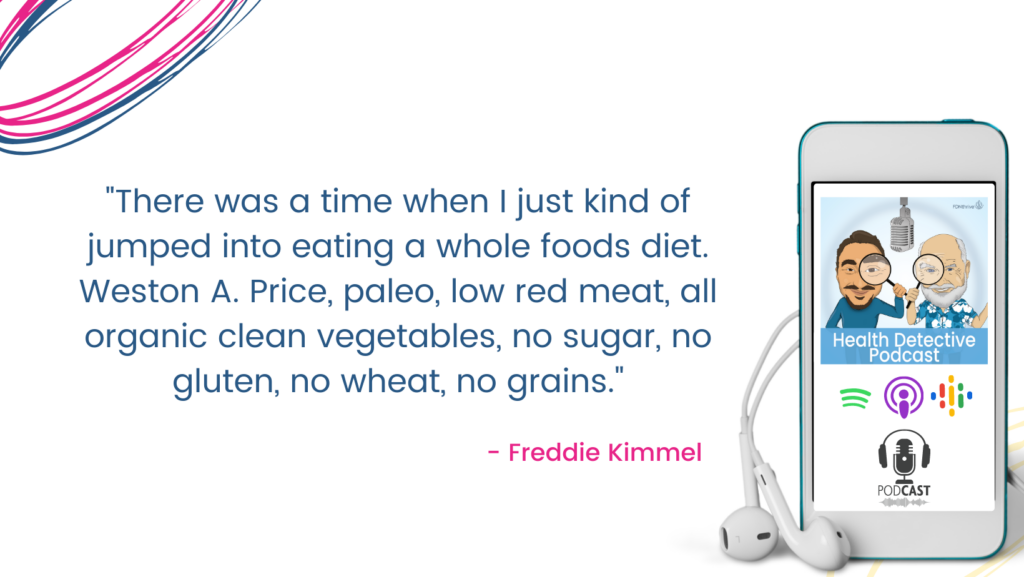
It sounds like the American diet is not serving me very well. I really went all in. In the middle of all these things happening, it’s not so linear. I didn’t wait to have all these bad things and then do food. There was a time when I just kind of jumped into eating a whole foods diet. Weston A. Price, paleo, low red meat, all organic clean vegetables, no sugar, no gluten, no wheat, no grains. And I ate that way till today, I just did it. I was like it’s not going to be a whole 30, it’s a whole everything at this point.
I had a huge, huge improvement in inflammation. My joints for the first time, like really, really felt differently. That was really inspiring to me. Honestly, I think that I just kept opening doors. There were times when I was really struggling with the abdominal adhesions, and I remember I started doing red light therapy on my belly. Low level laser, or photo biomodulation, or really these very gentle diodes on my belly.
And I had a great reduction in the time that my intestines were cramping. Eventually, I bought a system called AmpCoil, which is pulsed electromagnetic field and frequency. Now that’s probably the biggest investment I’ve ever made. When I bought that, I didn’t try it. Saw about it on the internet. I was so desperate.
AmpCoil
I had a huge mold exposure on top of all these other things – bad! Had to gut my apartment down to the bones. I know, what the heck, Freddie? But here’s the thing. At this point, either people are still listening, or they’ll turn it off because they’re like, who is this sad sack of crap? Or they’re like, wow! This guy really is set up to speak about chronic illness from a place of integrity because he’s done it.
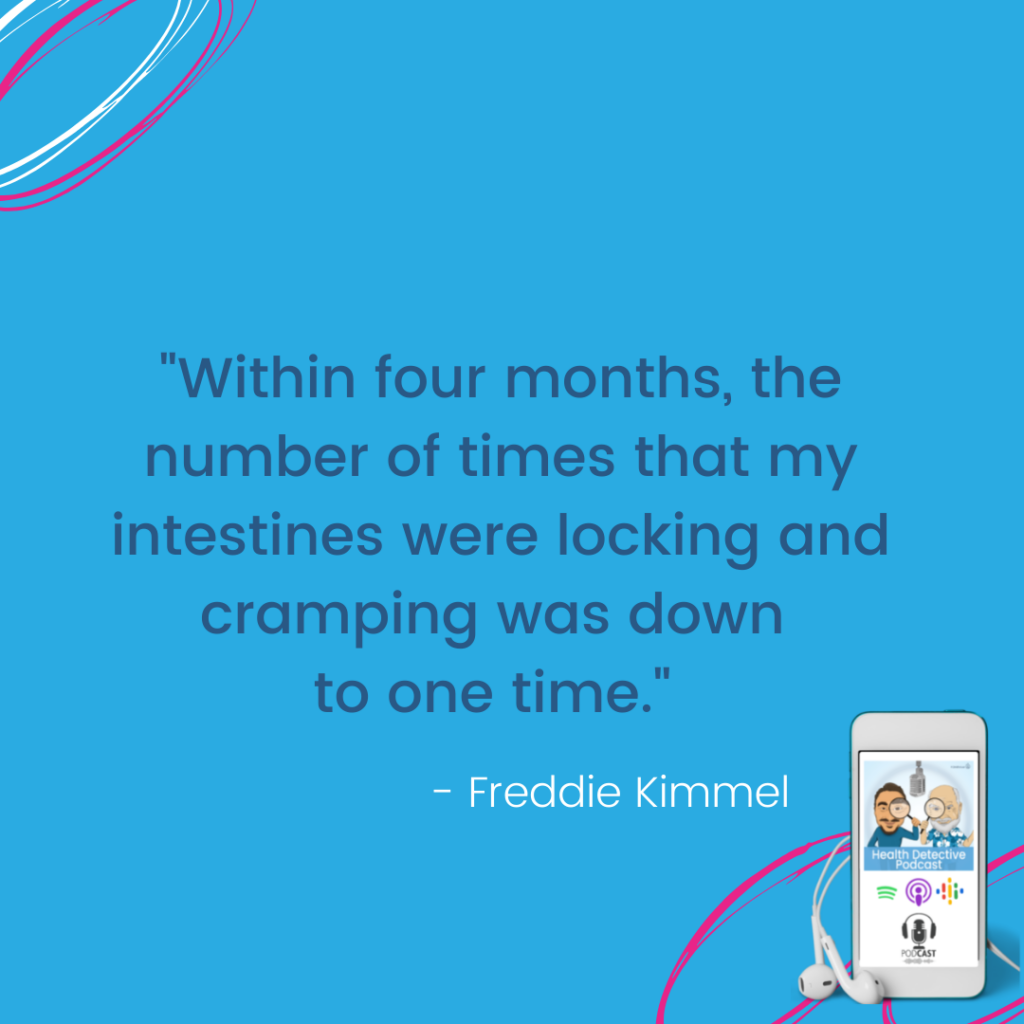
So, I bought the system called an AmpCoil, which has pulse electromagnetic field and frequency therapy. Within four months, the number of times that my intestines were locking and cramping was down to one time. Now, it’s 2022, I haven’t had a surgery since 2015.
Detective Ev: Yeah baby!
Freddie Kimmel: Yeah.
I mean, it happens, right? I get days where there’ll be a little pain. I’ll get some gas trapped. But I can release it in six hours, not 48 or not going to the ER. Listen, I always speak to total. I am so humble about this. I know tomorrow you could be like, well, we released that podcast and Freddie went in and that was cool. That was it. A lot of this stuff is luck. I know I have a will in it. I know there’s also a universal guiding force that’s allowing me to be here. I just want to pay homage to the things that I don’t understand in existence.
[00:40:20] Detective Ev: Even finding some of this information, like I’ve been in this space for eight years.
I had never heard of AmpCoil until I’m down there with you. Let’s say that’s something I had needed to get my stuff. It’s like, no, there is a lot of luck. And it’s hard not to think back sometimes, especially with a story like this. You’re just like, wow, considering how passionate we get about this.
Connect the Dots
I love that you brought that up. Cause I don’t have a problem saying it if someone else says it. I don’t have a problem saying it in general, but I don’t want to impose on anyone else. I can’t help but feel like this is exactly why I’m here. This is exactly why you are here. Because look at how you’ve taken this man.
There’s a few people ever I’ve met with an aura like you. I don’t have to even talk to you to just know that there’s some deep stuff there. Because you can’t fake the aura. There’s like a wisdom and appreciation for life. But it’s, wow! That’s all I can say about it.
It’s terrible. We wouldn’t wish it on anyone. Probably wouldn’t choose to do it again. But it’s hard to say you wouldn’t look back and say, well, I don’t know if I’d change it per se. Because look at what it’s been able to make you do and just how many people you’ve helped and stuff.
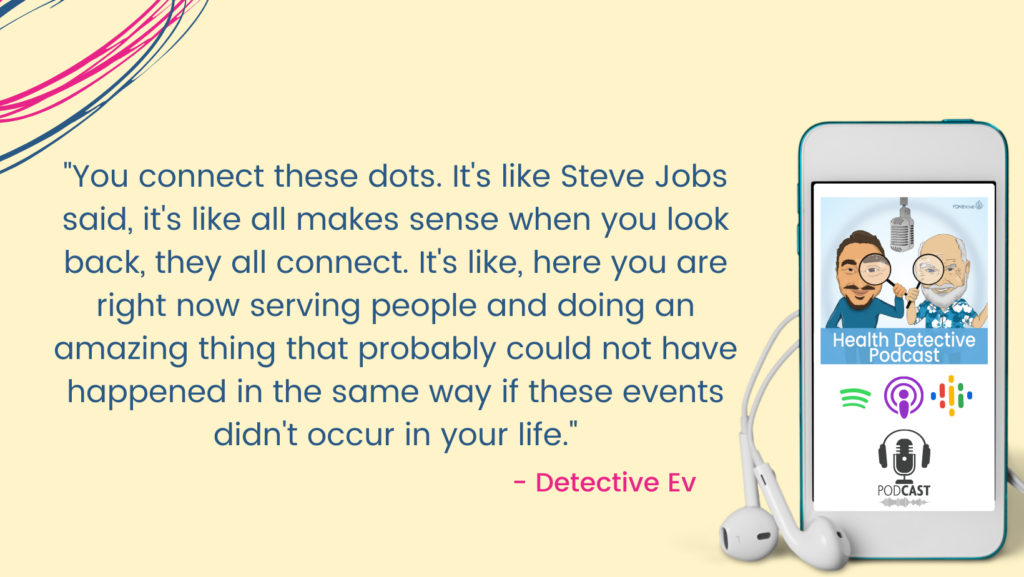
I don’t want to speak for you either, but it’s kind of crazy to think. You connect these dots. It’s like Steve Jobs said, it’s like all makes sense when you look back, they all connect. It’s like, here you are right now serving people and doing an amazing thing that probably could not have happened in the same way if these events didn’t occur in your life.
Conclusion
[00:41:40] Freddie Kimmel: Yeah. Yeah. I could never speak to it. Even early on, like I said, when I got done with cancer, I was like, I’m going to write a book. I’m going to do this. Well, I had no level, aside from being blessed with DNA that had me wired for positivity, cause that was true. Do you know what I mean? Even going through cancer, I wrote a blog called Dr. Fred. I laugh about it now. I just wrote about my experience. It was nothing really about health other than that, I’m a bad-ass cause I made it through. That was the theme of the blog.
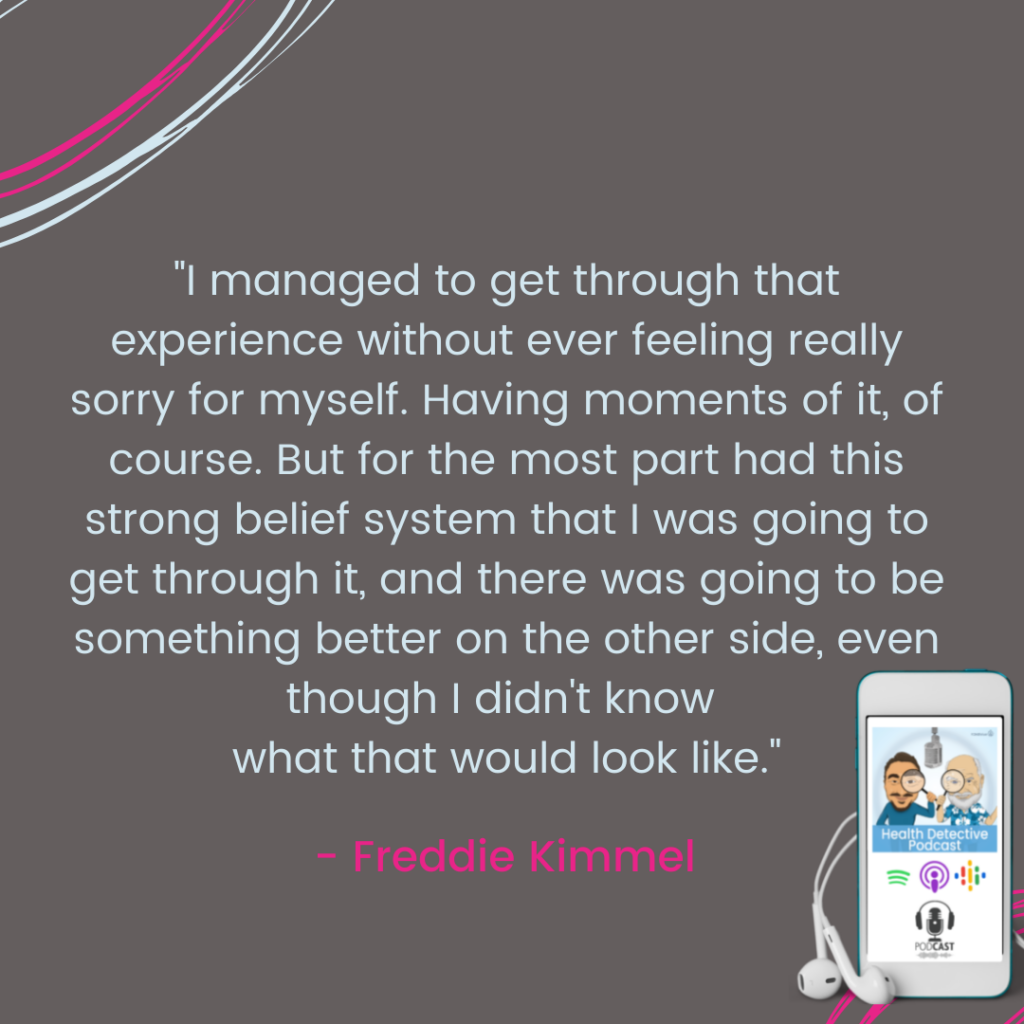
That’s all I did. I was like, guys, here’s what they just did to my belly. I’m like, I’m smiling and there’s a cute nurse walking in my room and I’m still asking her for her number. I made the best out of that experience. I managed to get through that experience without ever feeling really sorry for myself. Having moments of it, of course. But for the most part had this strong belief system that I was going to get through it, and there was going to be something better on the other side, even though I didn’t know what that would look like.
[00:42:44] Detective Ev: Hey folks. Ev here. That will do it for Part One with Freddie Kemmel. We will be back with his resolution and the things that he learned and just the wisdom that he brings to this life because of his experiences in part two. So go check it out. We’ll talk to you guys again soon. Take care.
[00:42:58] Intro/Outro Voice: Thanks for tuning in to the Health Detective Podcast. If you are finally ready to work with a real health detective on your health journey so that you can get well and stay well naturally, visit us at fdnthrive.com and click the button to schedule a Free Health Review.

